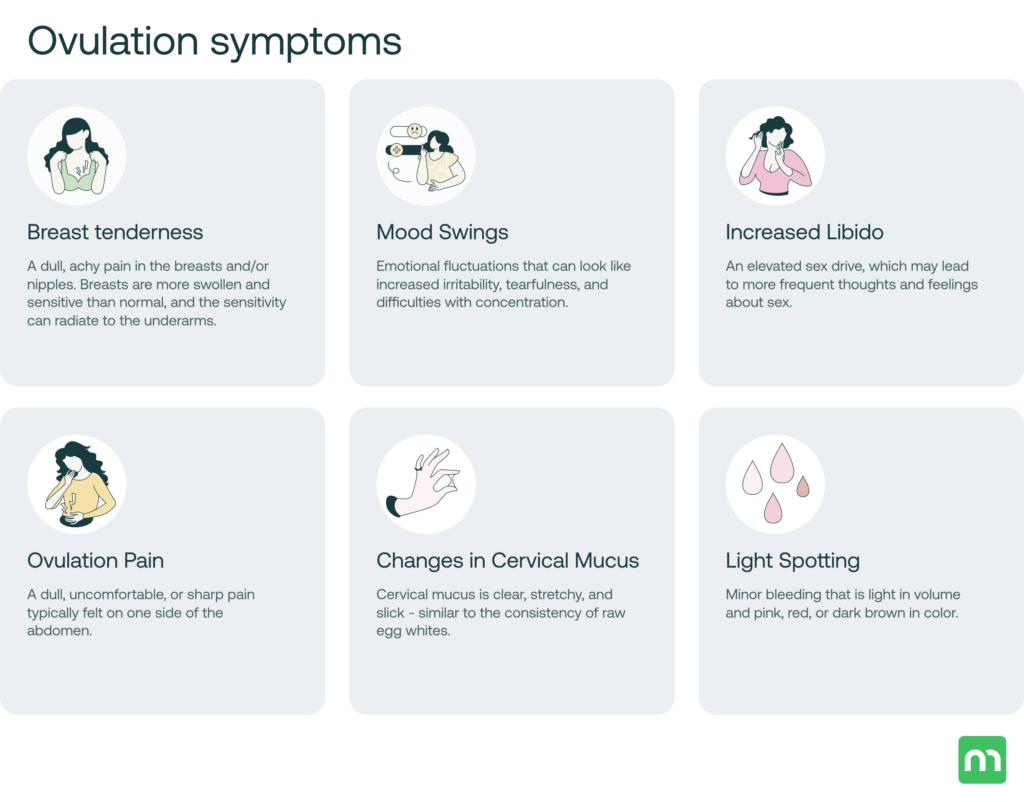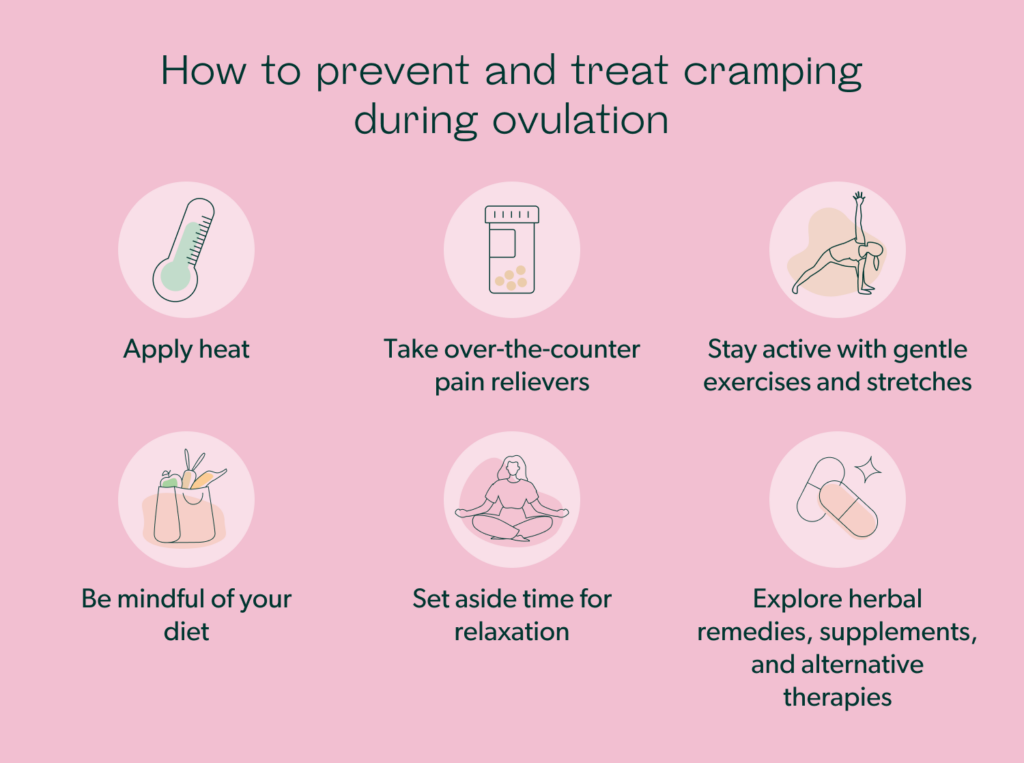Ovulation Pain: What Causes Ovulation Cramps & What They Mean
From a dull ache to a deep and intense throb, cramps are an unfortunately familiar experience for anyone who gets their period. They usually signal the start of your period, but what does it mean when they happen in the middle of your cycle?

In this post, we’ll cover everything you need to know about this special type of cramping, known as “ovulation cramps”. We’ll discuss what they are, what causes them, how to cope with the pain, and when you may need to see a doctor. We’ll also answer some of your most frequently asked questions about ovulation pain and cramping.
What Are Ovulation Cramps?
Commonly called “mittelschmerz” from the German words for “middle” and “pain”, ovulation cramps are a type of cramp that occurs around the time of ovulation – i.e. when an egg is released from an ovary.
Although they differ from menstrual cramps, ovulation cramps are perfectly normal. In fact, researchers estimate that approximately 20% of women experience cramping during ovulation.
Sometimes it can be easy to confuse ovulation cramping for other health concerns. For example, appendicitis, endometriosis, and ovarian cysts can all cause pain in the pelvic region and lower abdomen – although the pain in these cases is typically more severe.
If you regularly experience abdominal cramping outside of your period, it’s worth tracking your cycle and symptoms. Tools like the Mira App and Analyzer enable you to pinpoint ovulation over the course of several cycles, allowing you to clearly see whether or not your cramps typically align with your day of ovulation.
Does Ovulation Cause Pain?
Ovulation is the stage of the menstrual cycle where an egg is released from one of the ovaries. The process itself is not inherently painful and not everyone who experiences ovulation will experience ovulation cramping. However, for some, ovulation can be painful and cause cramping.
Cramping during ovulation may feel like an ache, a sharp twinge or pull, or pain on one side of the abdomen, and can also be accompanied by bleeding or spotting. In most cases, the pain is minor to moderate and doesn’t last longer than a couple of days.
What Causes Ovulation Cramps?
The exact cause of ovulation cramps is unknown but there are several theories as to why it might occur.
One theory is that as the follicle grows to accommodate a maturing egg, it may stretch the surface of the ovary and cause pain or a pulling feeling. The follicle swells and ruptures to release the egg – and the fluid released, together with the egg, may be a source of cramping during ovulation as they can irritate the inner lining of the abdomen and pelvis.
It’s also important to note that the follicle contains more than just a maturing egg, and as the egg is released, blood and other fluids come with it. Until that fluid is reabsorbed, it can cause inflammation and irritation that is felt as cramping.
Ultimately, the pain is due to how the process of ovulation occurs, and it is understandable to experience some discomfort with the swelling, rupturing, and increased fluid during ovulation.
What Are the Symptoms of Ovulation Cramps?
Ovulation cramps differ from menstrual cramps in a few key ways. Aside from how the pain feels, menstrual cramps happen just before or during your period whereas ovulation cramps occur around ovulation.
Related: Is Period Flu Real? Causes and Symptoms Explained
Pain or cramping on one side of the abdomen
For some people, the ovaries take turns releasing an egg so that each ovary only releases an egg every other month. In this case, you will likely feel the pain on the side where the ovary is releasing an egg, and the pain can switch from one cycle to the next depending on which ovary is ovulating.
Pain that starts midway through your cycle
Assuming there is no variation in your cycle length, ovulation usually occurs two weeks before the start of your period and any pain usually occurs on the day of ovulation or the day after. Of course, if you are tracking your cycle, you can start to predict it and you may notice patterns or symptoms of ovulation and your pain.

Dull, uncomfortable, or sharp pain
Pain is a uniquely personal experience and each individual will experience it differently. Some experience an overall dull and uncomfortable sensation in the abdomen, while others experience a sharp pain, twinge, or pull.
Ovulation pain is commonly described as uneasy pressure or sharp cramps – but should never be severe. Severe pain should never be ignored, and it’s important to consult with your doctor if you feel your pain is stronger than normal.
Factors Affecting the Intensity of Ovulation Cramps
We’ve established that it’s perfectly normal to feel some slight pain or discomfort during ovulation. However, there are certain underlying factors that can make ovulation pain more intense. Here are just a few examples to bear in mind.
Hormonal imbalances
Hormones such as estrogen, progesterone, and luteinizing hormone (LH) play a critical role in helping our reproductive organs function the way that they are supposed to. And when these hormones are out of balance, this can lead to a number of frustrating symptoms – including pain/cramping in the pelvic area that may intensify around the time of ovulation.
Other symptoms of hormone imbalance include spotting, missed periods, acne, unwanted hair growth, hair loss, and weight gain.
Previous pelvic infections
Sometimes pelvic infections, such as chlamydia or gonorrhea, can cause scarring, and this scarring can easily become inflamed when it is exposed to fluid from an ovulating follicle. The result? Recurring feelings of pain and cramping around the time of ovulation each cycle.
Endometriosis
Endometriosis is a condition where tissue similar to the lining of the uterus (the endometrium) grows on other organs and anatomic structures outside of the uterus. For example, endometrial tissue can implant itself on or around the ovaries and/or the fallopian tubes – which are both involved in ovulation. The presence of this excess tissue can then cause pain during ovulation.
To learn more, check out our article Endometriosis and Ovulation Pain: Causes, Symptoms, and Treatments.
Polycystic Ovary Syndrome (PCOS)
Polycystic Ovary Syndrome (PCOS) is a condition that affects ovarian functioning, and in some cases, can cause tiny fluid-filled sacs (follicles) to appear in the ovaries. The presence of these follicles in the ovaries can then cause pain during ovulation.
Trauma and stress
Any type of surgery in the abdomen or pelvic area (such as a cesarean section, appendix surgery, or surgery for endometriosis) can leave behind scar tissue. This scar tissue can then become inflamed during ovulation which can be painful.
Additionally, if your body is under stress due to physical or emotional factors, you may also be more susceptible to experiencing pain during ovulation. This is because stress can lead to an imbalance of neurotransmitters, and in turn this can affect the perception of pain.
How to prevent and treat cramping during ovulation
It may be impossible to prevent ovulation cramps, as they are a natural byproduct of ovulation and how the process occurs.
However, just because it’s perfectly natural to experience ovulation cramps, that doesn’t mean you have to suffer in silence. Most ovulation pain can be treated with the help of over-the-counter medications and/or home remedies – without the need for medical intervention.
Apply heat
When it comes to coping with ovulation cramps, heat will be your best friend! Heat not only helps your muscles relax, but it can also help to promote blood flow and increase circulation. We recommend taking a hot bath or placing a heating pad or water bottle on your abdomen – this can help you get some instant relief from pain due to ovulation.
Take over-the-counter pain relievers
Basic over-the-counter pain relievers like ibuprofen, acetaminophen, naproxen, or other NSAIDs can help to relieve general pain and swelling during ovulation.

Stay active with gentle exercises and stretches
Staying active is a great way to relieve tension, boost happy hormones, and improve your overall sleep quality. It’s also a wonderful way to keep yourself distracted from the discomfort of ovulation!
Although you may not be feeling up for your normal exercise class or gym session, you can still benefit from gentle exercises such as walking, stretching, yoga, and swimming.
Be mindful of your diet
The food we eat can have a huge impact on the way we feel. In fact, a balanced diet (one that is rich in fruits, vegetables, lean proteins, and healthy fats) can help balance your hormones and regulate ovulation.
To reduce pain during ovulation, it’s also a good idea to stay away from foods that may cause inflammation. This includes processed foods, fried foods, red meat, trans fats, and foods high in added sugar.
Set aside time for relaxation
Sometimes life can get so hectic that we forget to make relaxation a priority – even though the benefits of relaxation are endless! Relaxing not only helps your hormones stay in balance, but it can also improve your sleep.
Everyone’s idea of a relaxing activity is different – we recommend finding something that you enjoy doing and regularly penciling in time with yourself to do it.
Explore herbal remedies, supplements, and alternative therapies
Certain herbal remedies and supplements may help with general inflammation, which in turn can help to relieve pain due to ovulation. For example, Healthline mentions that curcumin, chamomile, peppermint, lavender, ginger, ashwagandha, and a combination of cinnamon, clove, rose, and lavender may help to relieve symptoms associated with endometriosis.
Other alternative treatments that may help with pain management during ovulation include breathing techniques, guided meditation, acupuncture, and massage therapy.
Other possible causes for abdominal cramps
Abdominal cramps aren’t always caused by ovulation or menstruation. Sometimes, abdominal pain or cramping may be a sign that something else is going on.
For example, abdominal pain and/or cramping is a known symptom of the following:
- pelvic inflammatory disease (PID)
- Urinary tract infections
- Sexually transmitted infections (STIs)
- Ectopic pregnancy
- Ovarian cysts
- Endometriosis
- Uterine fibroids.
Generally speaking, any health issue that is likely to cause irritation or swelling may be the cause of your abdominal pain.
When to see a doctor for ovulation pain
Most of the time, ovulation pain isn’t something to worry about. However, you should always trust your gut. Sometimes ovulation pain can be a sign of an underlying medical condition, so if your pain seems unusual or more severe than “ordinary” pain, you should seek treatment.
If your pain is accompanied by heavy bleeding, fever, or nausea, this could indicate that something more serious is going on. If this is the case, you should speak with your doctor immediately for further advice.

Ovulation cramps FAQs
What is the duration of ovulation cramps?
Depending on the individual, the duration of ovulation cramping can range from a few minutes to a few days around the time of ovulation.
Can ovulation cramps indicate fertility?
No. There is no evidence that suggests that ovulation cramping is a sign or indication of “good” fertility.
Are ovulation cramps the same as menstrual cramps?
No. While ovulation cramps and menstrual cramps may feel similar, they differ in terms of timing. Ovulation cramps occur around the time of ovulation (midway through your cycle), and menstrual cramps occur ahead of or during your period (which marks the start of your cycle).
Can ovulation cramps be a sign of pregnancy?
No. Ovulation cramps are not a sign of pregnancy. However, because ovulation cramping can feel similar to implantation cramping, it is possible to mistake one for the other.
The only way to know for sure if you are pregnant is to take a pregnancy test at the right time, which is no sooner than 12 days past ovulation (12 DPO) or the first day of your next missed period.
Are there any natural remedies for ovulation cramps?
Yes, there are certain supplements and treatments you can try that may help to alleviate pain due to ovulation cramping.
Herbal remedies include: curcumin, chamomile, peppermint, lavender, ginger, ashwagandha, and a combination of cinnamon, clove, rose, and lavender.
Other alternative treatments you can try for general pain management include: breathing techniques, guided meditation, acupuncture, and massage therapy.
Can stress make ovulation cramps worse?
Yes. Emotional or physical stress can lead to hormone imbalance, which may disrupt ovulation and make ovulation cramping worse.
Is it normal to have severe ovulation pain?
No. Severe ovulation pain is not normal. If your pain around ovulation is severe, make an appointment with your healthcare provider for further advice.
Can birth control pills help alleviate ovulation cramps?
Yes. Certain birth control pills stop the body from ovulating, which eliminates ovulation pain altogether. If this is a treatment method you are interested in, we recommend speaking with your doctor for the best advice for your individual situation.
Should I be concerned if I experience no ovulation pain?
No. Not everyone experiences ovulation pain – and that’s okay! There is no reason to be concerned if you have never experienced or noticed it before.
Mira’s Editorial Process
All content produced by Mira meets stringent editorial standards, ensuring excellence and accuracy in language and medical precision. Every piece undergoes thorough fact-checking and review by qualified professionals. Check out our full editorial process to learn more.













